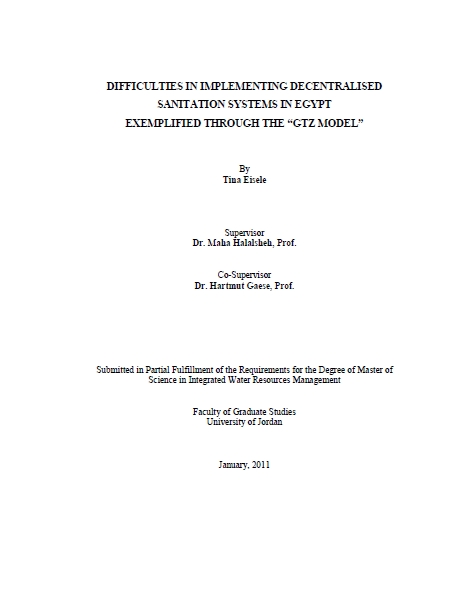Difficulties in implementing decentralised sanitation systems in Egypt exemplified through the GTZ model
Eisele, T. (2011)

Published in: 2011
Publisher:
Master Thesis, Faculty of Graduate Studies, University of Jordan and Institute for Technology and Resources Management in the Tropics and Subtropics (ITT), Cologne University of Applied Sciences, Germany
Author:
Eisele, T.
Uploaded by:
SuSanA secretariat
Partner profile:
common upload
7643 Views
163 Downloads
Location of library entry
Content - Summary
In Egypt, water supply has considerably improved over the last decades, yet the provision of wastewater services did not correspond to the same extent, and mainly rural areas lack appropriate sanitation systems. As a result of insufficient wastewater treatment and disposal, both population and environment are increasingly threatened by pollution and unhygienic conditions. The establishment of decentralised sanitation systems can support overcome these shortcomings in rural Egypt.
This study aims at investigating difficulties in implementing decentralised sanitation services in Egypt. For this purpose, the establishment of the so-called “GTZ model” – a decentralised sanitation system, in Governorate Kafr El Sheikh in Egypt is investigated. Through the review of scientific literature related to the topic as well as through the review of project documents, and interviews and consultations with different stakeholders, different features related to the topic are
investigated. The study mainly focuses on socio-economic and institutional
aspects, with special reference to governance. As there is lack of scientific literature that tackles these aspects, this study can be seen as an important contribution towards bridging this gap.
See also the SuSanA case study on this project:
http://www.susana.org/lang-en/case-studies?view=ccbktypeitem&type=2&id=1224
Bibliographic information
Eisele, T. (2011). Difficulties in implementing decentralised sanitation systems in Egypt exemplified through the GTZ model. Master Thesis, Faculty of Graduate Studies, University of Jordan and Institute for Technology and Resources Management in the Tropics and Subtropics (ITT), Cologne University of Applied Sciences, Germany
Filter tags
Case studies in other formats English Greywater or wastewater Middle East & North Africa Rural














